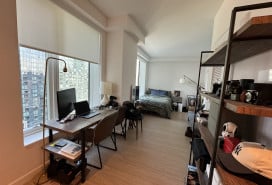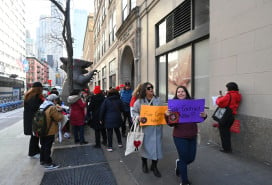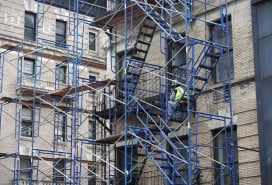Worried that construction next door is damaging your condo building? Here's what to do
I'm worried that construction next door could be damaging the common brick wall of our condo (one in a row of townhouses). The city has issued a full stop order twice. On one occasion our basement was flooded due to a pipe bursting next door. How do we get an official inspection next door and possibly seek damage costs?
Before you pursue litigation, you'll want to consult your own condo's records for more information, according to our experts.
First, look at your condominium declaration to see whether the wall you're concerned about is in fact a common element between the two buildings, says Avi Kimmel, an attorney with the firm Wagner Berkow (FYI, a Brick sponsor).
"The bylaws of the condo will almost certainly detail the respective obligations of the condo and unit owners in the event of damage to the wall," he says. "The condo also likely has an alteration agreement with the adjacent unit owner, which would contain indemnities and lay out the insurance requirements. You should immediately notify your condo board in writing of any issues or damages so it can take appropriate action."
As for the stop-work orders, you can check with the city for further information. The Department of Buildings has a database that allows you to look up permit filings and violation data for any property. If you think there are violations the city missed, you can file a complaint with 311.
Furthermore, your apartment insurance should cover the water damage, though you'll need to confirm you're protected in the event of structural damage to the wall.
"We strongly recommend that you contact your own insurance company. Note, however, that your insurance may not cover the damage to the wall if it is a common element, or if the damage is not a covered loss," Kimmel says. "The condo [board] should immediately be notified of any damages to the wall or other parts of your property so it can seek appropriate indemnification under the alteration agreement, or make an insurance claim."
Should your board opt to hire an attorney, they should initially do so on a consulting basis, according to Deanna Kory, a broker with Corcoran.
"The idea is to get [the lawyer's] advice on how to proceed, and then if they are needed to intervene from a legal standpoint, they’re completely knowledgeable and on board," Kory says. "Many small co-ops have attorneys at the ready, but you need to make sure that that attorney is equipped to deal with these kinds of situations."
And there are some immediate, practical steps you can take right now to protect yourself—from pests, that is.
"With major construction you want to be sure that the exterior is rodent-proof, with no gaps around pipes or gaps under doors so rodents don't find a new home," says Gil Bloom of Standard Pest Management. "Perhaps placement of some traps and weekly checking might be advised as well."
Trouble at home? Get your NYC apartment-dweller questions answered by an expert. Send your questions to [email protected].
For more Ask an Expert questions and answers, click here.
You Might Also Like





























